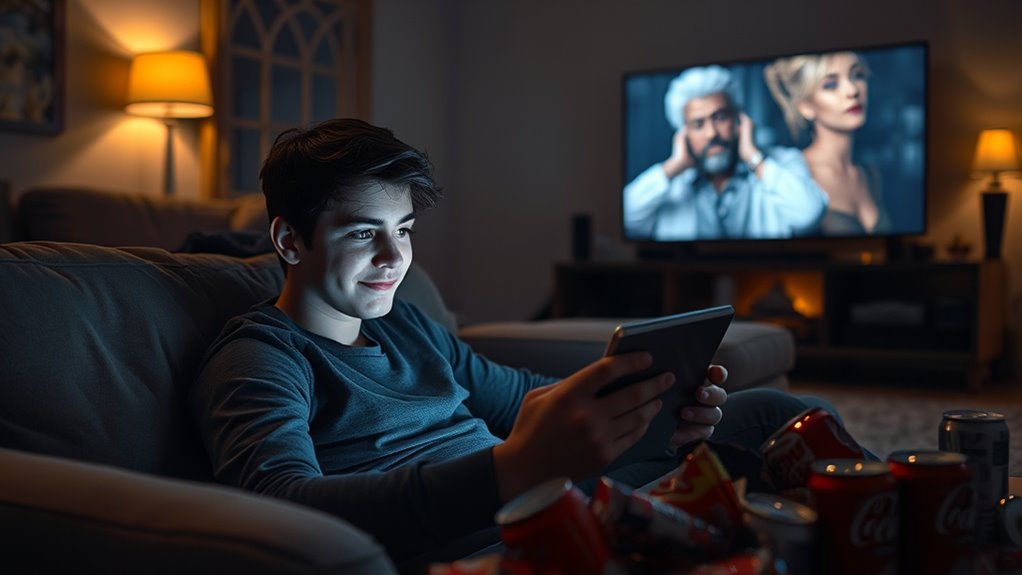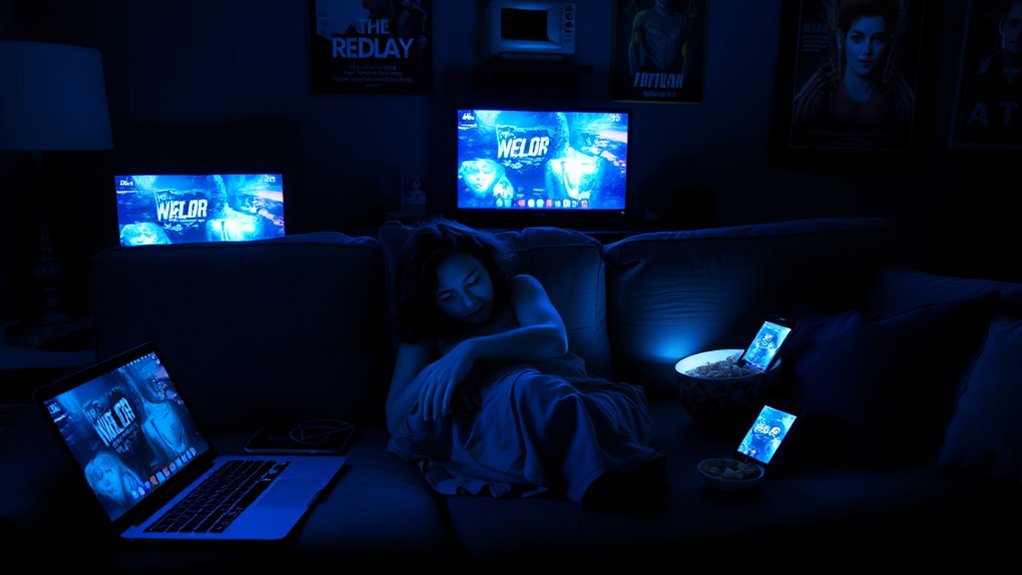Binge-watching taps into your brain’s reward system, creating emotional attachments to characters and storylines. These emotional bonds release dopamine, making you feel pleasure and motivating you to keep watching, especially with cliffhangers and effective storytelling techniques. This cycle of reward and emotional connection reinforces your behavior, gradually blurring the lines between entertainment and fulfillment. Understanding these psychological factors can help you recognize why binge-watching feels so compelling—and why it impacts cultural habits more deeply than you might think.
Key Takeaways
- Binge-watching creates emotional bonds through storytelling, activating the brain’s reward system and releasing dopamine for pleasure.
- Streaming platforms strategically use cliffhangers and compelling narratives to reinforce addictive viewing habits.
- The cycle of emotional reinforcement and reward influences cultural norms around consumption and social engagement.
- Neurochemical responses, especially dopamine release, underpin the compulsive desire to continue watching, impacting mental well-being.
- Recognizing these psychological mechanisms can promote mindful viewing and influence cultural perceptions of entertainment consumption.

Binge-watching has become a popular way to consume entertainment, often leading viewers to spend hours glued to their screens. As you plunge into multiple episodes, you might not realize how deeply you’re forming an emotional attachment to characters and storylines. This attachment isn’t accidental; it’s rooted in your brain’s reward system, which responds positively to the content you consume. When you watch a compelling scene or an emotionally charged moment, your brain releases dopamine, the chemical associated with pleasure and satisfaction. This creates a feeling of reward, encouraging you to keep watching to experience that same positive sensation again. Over time, this cycle of anticipation and reward can make it challenging to stop, even when you’re aware of how much time has passed.
Your brain’s reward system is highly responsive to storytelling because stories tap into fundamental human needs for connection and understanding. When you see characters facing struggles, triumphs, or emotional dilemmas, your brain mirrors those feelings, creating empathy and emotional investment. This emotional attachment makes you care about what happens next, fueling your desire to continue watching. It’s almost as if your brain is tricked into thinking that each episode offers a personal reward, reinforcing the habit of binge-watching. The more you engage with these narratives, the stronger the connection becomes, often blurring the line between entertainment and emotional fulfillment. Additionally, streaming platforms often use cliffhangers to increase the addictive quality of their content, encouraging prolonged viewing sessions. Moreover, the brain’s reward system is particularly sensitive to these storytelling techniques, amplifying their impact on viewer behavior. Understanding how storytelling techniques influence emotional engagement can help viewers develop more mindful viewing habits.
Stories fulfill deep human needs, creating empathy and emotional bonds that make it hard to stop watching.
This process can also explain why binge-watching feels so addictive. Your reward system is wired to seek out sources of pleasure, and streaming platforms leverage this by designing binge-worthy content that hooks you from the first episode. Cliffhangers at the end of episodes serve as a compelling incentive, leaving you enthusiastic to see what happens next. As you experience this cycle repeatedly, your brain begins to associate binge-watching with feelings of happiness, excitement, or relief, making it harder to resist the urge to continue. This isn’t just about entertainment; it’s about satisfying your brain’s craving for reward and emotional connection. Additionally, understanding the role of dopamine release in this process can help you better manage your viewing habits and prevent potential overindulgence.
Recognizing how your emotional attachment and reward system work together can help you recognize why binge-watching can become so compelling—and sometimes problematic. You’re not just passively consuming content; you’re actively engaged in a cycle of emotional reinforcement. By becoming aware of these brain mechanisms, you can develop healthier habits and set boundaries that protect your mental well-being.
Frequently Asked Questions
How Does Binge-Watching Affect Long-Term Mental Health?
Binge-watching can impact your long-term mental health by affecting emotional regulation and causing cognitive overload. When you binge, you might struggle to process emotions effectively, leading to increased stress or anxiety. The constant stream of content overloads your mind, making it harder to focus or relax later. Over time, these patterns can contribute to mood swings, fatigue, and difficulty managing emotions, ultimately harming your mental well-being.
What Role Does Social Media Play in Promoting Binge-Watching Habits?
Social media influence plays a big role in promoting binge-watching habits by showcasing viral content and trending shows. When you see friends or influencers sharing their favorite series, you’re more likely to check them out. Platforms push recommended content based on your interests, encouraging you to keep watching longer. This constant exposure to viral content makes it easier to fall into binge-watching, often leading to extended viewing sessions.
Are Certain Personality Types More Prone to Binge-Watching?
You know what they say, “birds of a feather flock together,” and your personality traits can influence your binge tendencies. If you’re high in traits like impulsiveness or sensation-seeking, you’re more prone to binge-watching. Conversely, those with conscientiousness may resist the urge. Recognizing these tendencies helps you understand why certain personalities are more susceptible, guiding you to develop healthier viewing habits and balance your entertainment choices.
How Does Binge-Watching Influence Sleep Patterns and Quality?
Binge-watching can substantially disrupt your sleep patterns and quality. You might experience sleep disruption as you stay up late to finish episodes, making it harder to fall asleep. The blue light from screens can interfere with your dreams, resulting in poorer sleep and restless nights. Over time, this cycle can lead to fatigue and decreased overall well-being. So, it’s best to set limits to protect your sleep health.
Can Binge-Watching Lead to Addictive Behaviors or Dependency?
Like a slow-burning fire, binge-watching can ignite habits that smolder into dependency. You might find yourself caught in a web of habit formation, craving the next episode to soothe emotional regulation needs. Over time, this pattern can deepen, making it harder to break free. You risk developing addictive behaviors as your brain associates screen time with comfort, blurring the line between entertainment and reliance.
Conclusion
Understanding why you binge-watch reveals more than just a habit; it taps into your need for comfort and escape. Recognizing these patterns helps you regain control and find healthier ways to relax. Remember, you don’t have to burn the candle at both ends—sometimes, less truly is more. By being mindful, you can enjoy entertainment without losing yourself in the process. After all, a little balance goes a long way in keeping your mind clear and your heart full.
Amina brings over a decade of journalism experience to her role as Editor-in-Chief. Under her leadership, Exquisite Post has flourished, maintaining the highest standards of integrity and excellence. Amina’s commitment to truth and her visionary approach guide the editorial team in producing impactful news stories that resonate with our audience.










